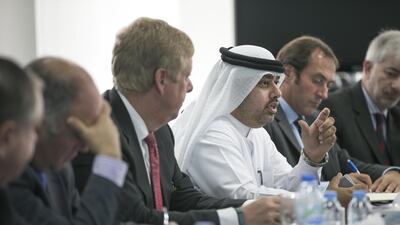ABU DHABI // The UAE could soon be able to develop its own products and technologies in defence, space and aerospace, due to collaborations with UK industry.
The Khalifa University of Science, Technology and Research (Kustar) hosted 26 British companies on Tuesday to discuss ways its growing number of graduates could work with the UK within the UAE.
“From our perspective, it’s largely a matter of engagement and it’s helpful for people representing these companies in these sectors just to get a little bit better of an idea of what it is we do here, what our key expertise is and how to engage with us,” said Tod Laursen, university president.
“This direct engagement is important because we’re producing graduates at a reasonably good rate and in industries that are not well-known in the UAE.
“Everybody in the UAE is acquainted with what a mechanical or computer engineer is but we’ve got graduates in biomedical and nuclear and some of these are new fields in the UAE, so we need to be able to create opportunities to make sure those students have good employment opportunities when they come out.”
The aim is not only to secure jobs for university engineers and scientists, but to effect knowledge transfer and enable local companies to innovate patentable technology.
“Kustar is highlighting its various innovation centres to tell British companies that they can contribute in various ways by investing, starting a joint lab and have positions filled by Emiratis and British,” said Matthew Cochran, chairman of the Defence Services Marketing Council and organizer of the event.
“So it’s really about what are the different ways to identify collaborative approaches between the UAE and the UK. Labs will help commercialise products coming out of here so it’s a huge step forward for the UAE because it’s not just knowledge transfer or building the print but they’re talking about innovating, stamping made in the UAE and doing it in sectors like defence, space and security.”
He said every country was looking to achieve local innovations, from a national security standpoint.
“It’s always useful from a strategic perspective to have your local experts who are able to work in these fields alongside best-in-class British companies in this case,” said Mr Cochran.
“Kustar should be the first stop for organisations looking to do business in these fields because this helps that ecosystem, not just as a vendor relationship but how are you going to transfer that knowledge and innovate new and patentable technology.”
“Aerospace, security and defence are growing in the UAE,” said Mr Laursen.
“What I see in aerospace represents a tremendous opportunity and there’s a lot of business coming here now. It’s globally relevant and the UAE’s advantage in this field will vanish if it doesn’t become a leader in innovating these parts at Mubadala with Boeing and Strata, for instance.”
He said the sector had a capable trained workforce. “It’s based on human capital development.”
The university has added another 300 students to its 1,366 enrolment of last year. An extension in February will add 100,000sqm to the campus, plus an aerospace research and innovation centre.
“The Abu Dhabi 2030 vision is trying to diversify the emirate’s economy from being mainly dependent on oil and gas to be more dependent on other types of sources,” said Dr Mohammed Al Mualla, the university’s senior vice-president of research and development.
“But the government, as part of that vision, realised that, to achieve that, they need to develop human capital. It needs to be of high calibre and very specialised. Mubadala, for instance, has a need to do its own designs in the future so we’re targeting the scientists and engineers of the future.”
cmalek@thenational.ae

